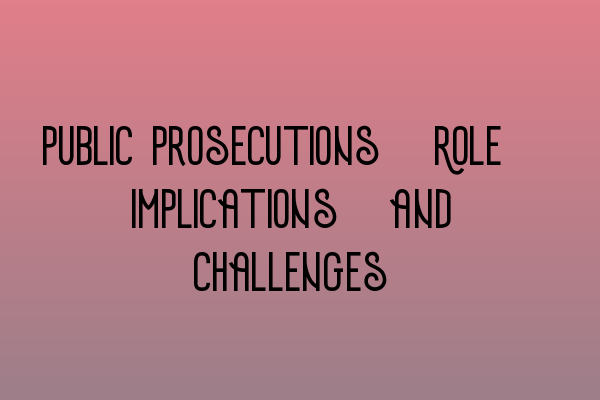Public Prosecutions: Role, Implications, and Challenges
When it comes to criminal law, one of the most vital components is the role of public prosecutions. Public prosecutors play a crucial part in the criminal justice system as they are responsible for bringing criminal cases against individuals who have been accused of committing crimes. Their role is to represent the interests of the state or the public and seek justice for victims. Let’s delve deeper into the implications and challenges faced by public prosecutions in the UK.
The Role of Public Prosecutions
The primary role of public prosecutions is to assess the evidence presented by the police and decide whether or not there is enough evidence to support a criminal charge. They must weigh the likelihood of securing a conviction based on the evidence and consider whether it is in the public interest to proceed with the prosecution. If they believe there is sufficient evidence and it is in the public interest, they will initiate the legal proceedings against the accused.
Public prosecutors also play a vital role during trials. They present the case on behalf of the state, examine witnesses, cross-examine the defense witnesses, and present arguments to persuade the court of the accused’s guilt. They must always act in an impartial manner, ensuring a fair trial and upholding the principles of justice.
Implications Faced by Public Prosecutions
While public prosecutions hold significant responsibilities, they also face various implications that can impact their effectiveness in delivering justice. One challenge is the significant caseloads they often encounter. Due to limited resources, prosecutors often find themselves handling multiple cases simultaneously, which can lead to increased pressure and potential delays in the justice process.
Another implication is the need to balance the interests of justice with the rights of the accused. Public prosecutors must ensure that their actions are fair and that the accused’s rights, such as the right to a fair trial, are protected. Striking the right balance between seeking justice and safeguarding individual rights is a complex challenge that requires skill and knowledge of legal principles.
Challenges Faced by Public Prosecutions
Public prosecutions face several challenges in today’s legal landscape. One significant challenge is adapting to advancements in technology and the new forms of crime they bring. Cyber-crime, for example, presents unique challenges in terms of gathering evidence and prosecuting offenders. Public prosecutors need to stay updated with the latest techniques and be knowledgeable in digital forensics to effectively handle such cases.
Additionally, public prosecutions face challenges related to public perception and confidence in the criminal justice system. Ensuring transparency and accountability in their actions is crucial to maintain public trust. Public prosecutors must consistently demonstrate integrity, professionalism, and ethical conduct to address these challenges.
